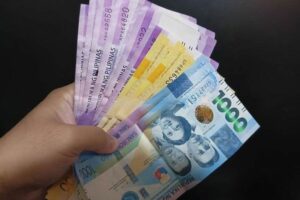PHL financial system’s total resources hit P32.8T
THE TOTAL RESOURCES of the Philippine financial system rose by an annual 9% as of October, preliminary data from the Bangko Sentral ng Pilipinas (BSP) showed. The resources of banks and nonbank financial institutions increased to P32.8 trillion as of October from P30.1 trillion in the same period a year ago. However, month on month, […]

THE TOTAL RESOURCES of the Philippine financial system rose by an annual 9% as of October, preliminary data from the Bangko Sentral ng Pilipinas (BSP) showed.
The resources of banks and nonbank financial institutions increased to P32.8 trillion as of October from P30.1 trillion in the same period a year ago.
However, month on month, total resources slipped by 0.9% from P33.1 trillion in September.
These resources include funds and assets such as deposits, capital, as well as bonds or debt securities.
BSP data showed banks’ resources jumped by 9.7% year on year to P27.28 trillion at end-October from P24.85 trillion a year ago.
Total resources held by universal and commercial banks climbed by 9.6% to P25.52 trillion as of end-October from P23.28 trillion in the same period in 2023. Big banks accounted for the bulk or 77.8% of total resources.
Thrift banks’ resources stood at P1.15 trillion, up by 7.4% from P1.07 trillion in the comparable year-ago period.
Resources held by digital banks surged by 34.8% to P113.8 billion as of October from P84.4 billion in the previous year. Only consolidated data from March 2023 are available for digital banks.
Rural and cooperative banks’ resources amounted to P498.3 billion as of October, higher by 17% from P425.8 billion last year.
Meanwhile, latest data showed that nonbanks’ resources went up by 5.3% to P5.52 trillion as of end-June from P5.25 trillion in the year-ago period. There are no data as of end-October.
Nonbanks include investment houses, finance companies, security dealers, pawnshops and lending companies.
Institutions such as nonstock savings and loan associations, credit card companies, private insurance firms, the Social Security System and the Government Service Insurance System are also considered nonbank financial institutions.
Rizal Commercial Banking Corp. Chief Economist Michael L. Ricafort said the growth in total resources has been consistent and “largely reflects the double-digit growth in banks’ loans, nearly twice faster (than) gross domestic product growth.”
Earlier BSP data showed bank lending grew by 10.6% to P12.5 trillion in October.
“Further cuts in Fed and BSP rates would reduce financing costs that would help boost demand for loans, though with some lagged effects. This may also reflect continued growth in banks’ net income,” he added.
The Philippine banking industry’s net profit rose by 6.4% to P290 billion in the first nine months of the year.
A BusinessWorld poll conducted last week showed that 13 out of 16 analysts expect the Monetary Board to reduce the key rate by 25 basis points (bps) at its meeting on Thursday.
If realized, this would bring the benchmark rate to 5.75% from the current 6%.
“The latest reserve requirement ratio (RRR) cuts effective Oct. 25 infused about P400 billion into the banking system that also partly supported the recent growth in loans,” Mr. Ricafort added.
The central bank slashed the RRR for universal and commercial banks and nonbank financial institutions with quasi-banking functions by 250 bps to 7% from 9.5%.
The BSP has said it plans to further reduce big banks’ reserve requirement to zero by 2029. — Luisa Maria Jacinta C. Jocson
















